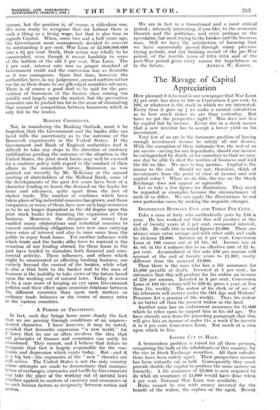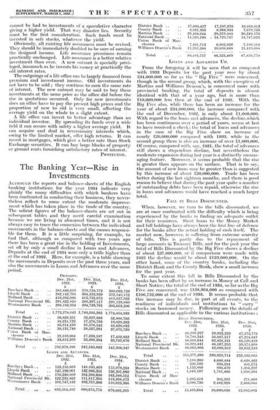The Ravage of Capital Appreciation How pleasant it is to
read in our newspaper that War Loan 8i per cent. has -risen-to 108 or Conversion 3 per cent. to 106, or whatever is the stock in which. we are interested. Every time it goes up I we make a mental calculation as to how much richer we are than yesterday. But have we got the perspective right ? Man does not live by capital but by- income. Every rise in a stock means that a new investor has to accept a lower yield on his investment.
Very few of us are in the fortunate position of having enough investment income to satisfy all our desires. With the exception of these fortunate few, the rest of us are savers—saving for our dependants, should our income be extinguished by death, or for ourselves so that we may one day be able to shed the worries of business and lead the life we like. We save to buy income. Capital is the means to the end. Should we not, _therefore, think of investments from the point of view the income and not capital value ? When we do this, the rise on the Stock Exchange does not appear so agreeable. Let us take a few figures for illustration. They must be regarded as examples because the circumstances o each of us differ. We can apply the illustrations to ou own particular cases by making the requisite changes.
DIFFERENCE BETWEEN FIVE AND THREE PER CENT. .
Take a man of forty who methodically puts by £50, year. He has worked out that this will produce at the end of twenty years at 5 per cent. compound interest; £1,736. He calls this in round figures £2,000. There.are always some extra savings and with other odds and ends he reckons £2,000. Interest, on 3 per cent. Conversion Loan at 106 comes out at £2 16s. 6d. Income tax' at 6d. in the £ reduces this to an effective rate of £2 4s. per cent. Accumulated at this rate £50 per annum will amount at the end of twenty years to £1,267, vastly different from the assumed £2,000.
Then there is the man who has a life assurance for £1,000 payable at death. f Invested at 5 per cent., lie estimates that this will_produce for his widow an income Of £50 per annum. Invested in 3 per cent. Conversion, Loan at 106 the return will be £28'6s. gross a year, or less than lls. weekly. The widow of his clerk or of one,of his labourers will receive under the Old Age and WidoWs' Pensions Act a pension of 10s. weekly. Thus, his widow' is "no better off than the poorest widow in the land.
Another man has an endowment assurance for £1,000 Which he relies upon to support him in his old age. We have already seen from the preceding paragraph that this, will give him an income of under lls. a week if he invests' it in 3 per cent. Conversion Loan. Not much of a surd upon which to live.
INCOME CUT IN HALF.
A tremendous problem is raised for all these persons,, comprising the bulk of the inhabitants of this country, bk. the rise in Stock Exchange securities. All their calculai tionS have been rudely upset. Their prospective income has been virtually cut in half. Consequently they must provide double the capital to produce the same income as formerly. A life assurance of £2,000 is now required to do *hat an assurance of £1,000 would have done wheii 5 per cent. National War Loan was available. ;Risks cannot • be run with money invested for the beriekt-of the widow, the orphan 'or the aged. Resort, cannot be had to investments of a speculative character giving a higher yield. That way disaster lies. Security must be the first consideration. Such funds must be invested in safe stocks, whateyer the yield. Obviously, all existing life assurances must be revised. They should be immediately doubled to be sure of earning the designed income. Life assurance premiums remain practically unchanged. Life assurance is a better relative investment than ever. A new entrant is specially privi- leged, inasmuch as he invests his money at practically the old interest rates.
The outgoings of a life office can be largely financed from premium and investment income. . 01d investments do not have to be sold ; they continue to earn the same rate of interest. The new entrant may be said to buy these investments at the same price as the office did before the rise in quotations occurred. Only for new investments does an office have to pay the present high prices and the proportion of new to old is very small, affecting the average yield on the whole to a slight extent. A life office can invest to better advantage than an individual investor. By spreading its funds over a wide field it can secure with safety a higher average yield. It can acquire and deal in reversionary interests which, owing to the limited market, offer high returns. It can invest in mortgages, which give a better rate than Stock Exchange securities. It can buy large blocks of property or ground rents furnishing satisfactory rates of interet:
PROTECTOR.



























































 Previous page
Previous page